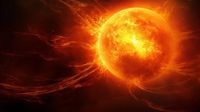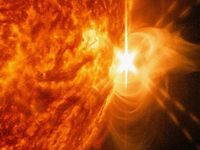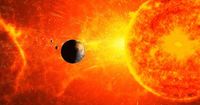On March 21, 2025, Earth is anticipated to encounter two significant geomagnetic storms that could challenge people sensitive to meteorological changes as well as those with chronic health conditions. The geomagnetic field is being destabilized due to heightened solar activity, a phenomenon that specialists have been nervous about since early morning.
This situation marks a notable shift in solar activity after a period of increased intensity. The K-index, which gauges solar activity, has recently stabilized, showing a green level of 3 on the scale, indicating a non-strong magnetic storm. Historically, this change is profound, especially considering that just weeks earlier, the K-index reached alarming heights of 7.
The first storm is forecasted to hit at 1:00 PM Moscow time, lasting approximately two hours, during which magnetic fluctuations are expected to peak at 6 points on the intensity scale. This event will be closely followed by a second bout of activity expected to occur later in the evening, between 8:00 and 10:00 PM, measuring 5 points. Such fluctuations pose concerns particularly for weather-sensitive individuals, including those with chronic diseases.
According to specialists from the Institute of Solar Activity, recent observations revealed one medium class M flare and several weaker class C flares, corresponding to an orange activity level of 4.7 on the flare activity index. With the K-index anticipated to rise again, experts estimate a probability of 58% for experiencing a magnetic storm and a mere 17% for a stronger one. Essentially, periods of geomagnetic activity can have real effects on human health, challenging many to manage their symptoms effectively.
People experiencing meteosensitivity often report symptoms that range from headaches and fatigue to significant blood pressure fluctuations and feelings of unease. These phenomena can linger for several days, with individuals noticing effects even before the magnetic storm onset and persisting for days following its abatement. Notably, the elderly or individuals with pre-existing health issues are at higher risk during these periods.
Dr. Andrey Kondrakhin, a physician specializing in the treatment of weather-related health issues, emphasizes the cumulative impact these storms can have. "During geomagnetic storms, patients frequently experience exacerbations of their conditions, particularly cardiovascular and neurological ailments. Symptoms such as increased blood pressure and anxiety attacks are common as well," he explains, highlighting how this natural phenomenon affects millions globally.
In light of these anticipated storms, experts offer various recommendations to help mitigate their influence. People experiencing sensitivity are advised to adopt a series of simple yet effective habits to preserve their well-being. Lowering physical and emotional stress during these times is crucial. Routine adjustments, like moderating caffeine intake, getting enough rest, and maintaining a balanced diet rich in vitamins and minerals, can be helpful.
Furthermore, regular consultations with healthcare providers are suggested for those in risk categories to discuss their medication regimens and overall health. Rest and a balanced diet can help alleviate some discomfort associated with these storms. Dr. Kondrakhin advises acknowledging one’s body signals and being proactive in managing one's health during geomagnetic disturbances.
Interestingly, historical records indicate that the most formidable geomagnetic storm observed occurred in 1859, known as the Carrington Event, since it disrupted telecommunication systems significantly. Such events demonstrate the potent force of our solar neighbor and its ability to affect life on Earth. While modern technological advancements allow for better predictions, the health implications associated with geomagnetic changes remain undeniable.
The forecast for the remainder of March continues to worry specialists: while the 21st promises disturbances, additional storms are anticipated later in the month and early April, with another strong magnetic storm expected on March 27, and intensified activity predicted from April 5 through 14. During this two-week period, the most severe storms are expected to hit on the 5th, 8th, 9th, and 10th, which pose a significant concern for weather-sensitive individuals.
For now, as March 21 unfolds, affected individuals are encouraged to pay close attention to their health and remain calm. Experts assure that with proper measures in place, symptoms can be managed effectively. "Don't panic, just focus on maintaining your health," is a common refrain among health professionals advising patients. The anticipation of a busy day resonates with meteorologists and healthcare experts alike. Observers are advised to stay updated as new findings will be reported, ensuring that the public is well-informed about these natural phenomena.
In a world ever more interconnected with nature's subtle balance, the dialogue between solar storms and human health continues, reminding us of our awareness' relevance in tandem with the universe’s unpredictable nature.







